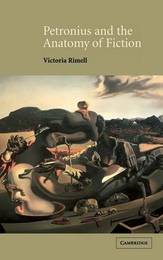
|
Petronius and the Anatomy of Fiction
Hardback
Main Details
Description
Petronius' Satyricon, long regarded as the first 'novel' of the Western tradition, has always sparked controversy. It has been puzzled over as a strikingly modernist riddle, elevated as a work of exemplary comic realism, condemned as obscene and repackaged as a morality tale. This innovative reading of the surviving portions of the work shows how the Satyricon fuses the anarchic and the classic, the comic and the disturbing, and presents readers with a labyrinth of narratorial viewpoints. Dr Rimell argues that the surviving fragments are connected by an imagery of disintegration, focused on the pervasive Neronian metaphor of the literary text as a human or animal body. Throughout, she discusses the limits of dominant twentieth-century views of the Satyricon as bawdy pantomime, and challenges prevailing restrictions of Petronian corporeality to material or non-metaphorical realms. This 'novel' emerges as both very Roman and very satirical in its 'intestinal' view of reality.
Author Biography
Victoria Rimell is a Junior Research Fellow at University College, Oxford.
Reviews'... succeeds in drawing from a wide range of both primary source material and recent secondary scholarship in its fashioning of an innovative critical interpretation of the Petronian text ... Rimell is in full command of both her subject matter and her thesis.' Mouseion, Journal of the Classical Association of Canada
|